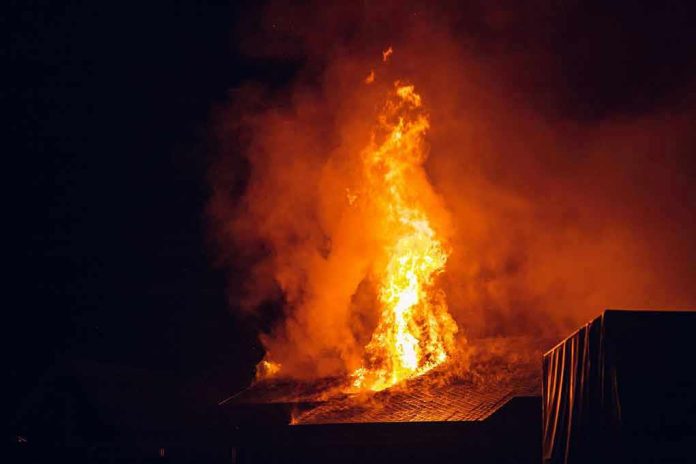
In a shocking turn of events, Albanian authorities have detained 18 individuals accused of igniting wildfires that have ravaged the country, leaving communities on edge and sparking international concern.
At a Glance
- 18 individuals arrested for allegedly starting wildfires in Albania.
- Over 12,000 hectares of land have been consumed by flames since mid-June.
- Albania seeks EU assistance as it struggles with record-breaking heat and drought.
- International firefighting support has been deployed to assist Albania.
Arrests Amidst Environmental Catastrophe
Albanian authorities have taken decisive action by arresting 18 individuals suspected of deliberately setting fires across the nation. These arrests come as a direct response to one of the most severe wildfire seasons in recent memory. Since mid-June, wildfires have scorched over 12,000 hectares, causing widespread devastation to forests and olive groves, critical to both the local economy and ecosystem. These fires have been fueled by an intense heatwave and prolonged drought, conditions exacerbated by climate change.
Albania detains 18 on charges of starting fireshttps://t.co/0oNKSKgV66
— Insider Paper (@TheInsiderPaper) July 29, 2025
With temperatures soaring to record highs and dry conditions persisting, the situation has spiraled into a full-blown crisis, forcing thousands of residents to evacuate. The government’s swift response in apprehending these suspects underscores the severity of the situation and the ongoing investigation into the motives behind such reckless actions.
International Support and Local Struggles
The Albanian government, acknowledging its limited firefighting resources, has sought assistance from the European Union. In response, the EU has activated its Civil Protection Mechanism, dispatching helicopters, aircraft, and over 1,000 firefighters from member states including Hungary, Croatia, and Italy. This international cooperation aims to bolster Albania’s efforts to contain the blazes and prevent further destruction.
Despite these efforts, the fires continue to rage, with new outbreaks reported almost daily. Satellite imagery has confirmed extensive damage, with some of the largest fires covering over 23,000 acres. The strain on local emergency services is palpable, as they work tirelessly to protect lives and property in the face of relentless flames.
Impact on Communities and Environment
The wildfires have had a profound impact on local communities, particularly in southern and southwestern Albania, where the fires have been most intense. The destruction of olive groves and forests has not only disrupted local economies but has also led to significant ecological damage, threatening biodiversity and increasing the risk of soil erosion and future flooding.
Residents are dealing with both immediate and long-term consequences. The immediate threat includes displacement and loss of homes, while the long-term effects pose challenges to agricultural productivity and environmental stability. The economic toll is substantial, affecting farmers and rural communities who rely on these resources for their livelihoods.
Future Implications and Response
The scale of these wildfires highlights the urgent need for improved fire management and prevention strategies. Experts emphasize the necessity for investment in fire-resilient infrastructure and community education to mitigate future risks. The Albanian government faces increasing pressure to strengthen its legal and institutional frameworks to prevent arson and manage land more sustainably.
While the motives of the arrested individuals remain under investigation, this crisis serves as a stark reminder of the intertwined challenges of climate change and human activity. The path forward will require a robust combination of international cooperation, effective policy-making, and community engagement to safeguard against future disasters.




